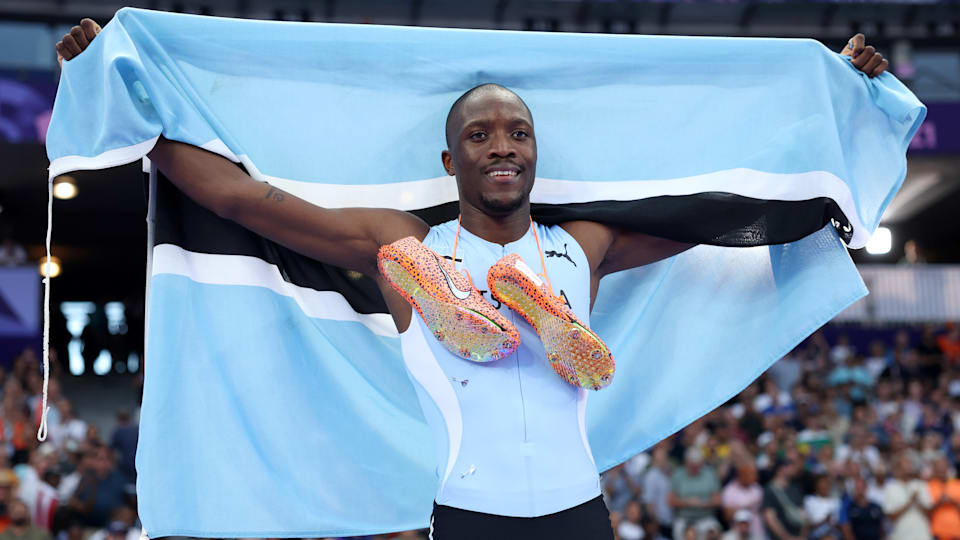Olympic 200m champ Letsile Tebogo on how he’s quietly taking the athletics world by storm: “I let the legs do the talking”
The 21-year-old struck gold in Paris to become Botswana’s first-ever Olympic champion. Now he is aiming to continue his rise in the sport in his own silent way.

Against the roaring backdrop of the Stade de France, one man went quietly about his business.
Eight athletes had entered the stadium for the Paris 2024 men’s 200m final, each harbouring the hope of being named Olympic champion.
Some pointed to the camera, others bounded onto the track, flinging their arms into the air to encourage the crowd to raise the noise levels even higher.
But for Letsile Tebogo, who only a year earlier had become Africa’s first world 100m medallist in athletics, the Olympic final seemed like a moment of quiet introspection.
As he settled into the blocks, the young athlete breathed deeply and glanced up at the sky. And, after a brief moment of silence in the stadium that was followed by the loud bang of the starter’s gun, he took his first steps in the race that would make him Botswana’s first-ever Olympic gold medallist.
The result was a surprise to many. The sport’s biggest showman Noah Lyles was favourite to complete the sprint double, having won the men’s 100m title just days earlier.
However, for all his quiet seriousness, it was Tebogo who triumphed when it mattered most, proving the age-old adage that actions speak louder than words.
“Athletes are all different, there’s the loud ones, there’s also the quiet ones,” Tebogo explained to Olympics.com in an exclusive interview where he compared his personality to some of the larger-than-life characters on the sprint scene today.
“So I prefer being silent and just let the legs do the talking. I’ve always been a reserved person, so athletics won’t change the person who I am.
“So I believe silence is the way.”
A unique talent redefining the role of an athlete
With the emergence of social media, as well as a public that loves the idea of vocal sporting rivalries, Tebogo does not fit easily into the mould many imagine of a modern-day athletics star.
However, he has found understanding at home in Botswana where he believes the expectations placed on him differ from other nations where work on the track is seen as only part of a track & field athlete’s role.
“It’s different in every country,” he told us. “When you get to my country, they understand, they know and they feel when to just let me be. Then in other countries, they want to ‘cringe’ or get that piece of you from everything you do. So it’s all different in other countries.”
Perhaps that is one of the reasons that Tebogo feels so comfortable training at home in Botswana, compared to other sprinters who have made their way to systems in the likes of the United States or Jamaica to hone their craft.
Beyond the peace he is afforded, Tebogo also points to the care and attention he is paid in Botswana where, instead of being one of many world-class sprinters, his talent is seen as unique, with those around him eager to see him fulfil his potential.
“There’s nothing really that makes us special when compared to the United States,” he said. “But all I can say is that Botswana will take care of a gem perfectly, more than the US can, because I believe the US has got too many athletes.
“So even if there’s a Letsile today, tomorrow there will be the next one. In Botswana you can’t find the next Letsile, so that’s how I’ve concluded it.”
Letsile Tebogo on being a role model and his hopes for the growth of sport in Africa
While he may be comfortable in silence, Tebogo has become a thundering inspiration for up-and-coming sprinters in Botswana and across the entirety of Africa.
At just 21 years old, the Paris 2024 champion also wants to be an example for those looking to follow his path in sport.
“Every step that you do, you have to think beyond that one step that you want to take for yourself because everybody is watching what you are doing,” he explained. “So you’ve got to make sure that you pave the right way for the stars coming up.”
While his Olympic gold medal has helped put African sprinting on the map in a way it has never been before, the young athlete is also eager to see more sporting events hosted in Africa, as is the case with the upcoming Dakar 2026 Summer Youth Olympic Games.
“It shows that Africa has got great potential to host big events,” he said of the Dakar Games. “And it would be nicer if we could take some of the big championships to be hosted in Africa.
“I believe as Africans we are tired of always travelling abroad. Why can’t we take a one-hour flight from our country into the next one and then go and compete?”
Tebogo will look to cement his position as one of the world’s greatest sprinters at next year’s world championships in Japan and, if he continues his rise, the next Olympics in Los Angeles in 2028.
He has raised expectations so much that the noise around him will undoubtedly grow as he continues his journey as one of the most exciting sprinters on the planet.
But don’t expect Tebogo to change with his newfound status, don’t expect him to suddenly become loud or outspoken.
Silence has proven to be no weakness for an athlete who is quietly making history on the track.
